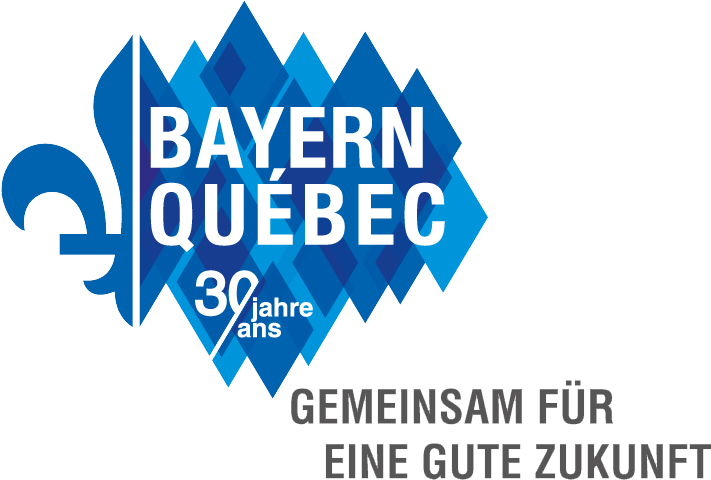|
|
|
Québec and Bavaria – A Role Model for Transatlantic Partnership on State Level
|
| |
|
|
|
The German Canadian Concourse (GCC) has built over the years a
far-reaching network of governmental, institutional, and corporate
partners to explore the innovative potential in Canada and Germany
and to advance collaboration in various fields of science and
technology. In this context, the cooperation of the GCC with the
representations of the German Länder and the Canadian provinces
plays an important role to embrace the full innovative diversity of
both federal systems.
 The
German Canadian Concourse maintains a long-standing partnership
with the Province of Québec and the State of Bavaria. Québec and
Bavaria themselves look back on a 30 year-long bilateral
cooperation. The
German Canadian Concourse maintains a long-standing partnership
with the Province of Québec and the State of Bavaria. Québec and
Bavaria themselves look back on a 30 year-long bilateral
cooperation.
On the occasion of the 50th anniversary of science and technology
cooperation between Germany and Canada, we wanted to understand
what makes the partnership between Bavaria and Québec in particular
so successful.
The GCC has met with Elisa Valentin, General Delegate of the Délégation générale du Québec à Munich, and Benjamin Emans, Director of the State of Bavaria Montréal Office, for an
interview.
|
|
|
|
|
|
Striving for Excellence through Transatlantic Cooperation
|
| |
GCC: Dear Ms. Valentin, dear Mr. Emans, Canada and
Germany are celebrating this year the 50th anniversary of the
Bilateral Intergovernmental Science and Technology Cooperation
Agreement. At the same time, Québec and Bavaria look back on a very
special transatlantic connection and outstanding cooperation for
three decades. Could you share with us some highlights of this
unique collaboration?
EV: Both regions have
been working closely together for more than 30 years and from the
beginning, this cooperation was understood to be holistic, which
means that it extends to all areas of public life, such as politics
and administration, business, science, research, technology,
innovation and also education and culture.
There are, of course, many highlights in this diverse
collaboration. To name them all would exceed the boundaries of this
interview. But to give you an example of our scientific
cooperation: we support a project between the Ludwig-Maximilian's
University of Munich and the Montréal innovation cluster on
climatology called Ouranos. The project investigates the effects of
climate change on extreme meteorological and hydrological events
and their implications for water management in our two regions.
This is a great example of two international project partners that
join forces to run climate models, linked with hydrological
modelling, using high-performance computing.
BE: In general, we see great economic benefits resulting
from our international cooperation. This is why our representative
offices support companies from both regions in exporting and in
establishing companies in the other partner's country. The close
cooperation and the trust that has grown over the years allow us to
open doors much more easily than it would be possible without our
local representative offices.
And of course, there is also an exchange of knowledge between the
project partners. This concerns both, the sharing of best practices
in public administration, as well as the content-based, scientific
exchange of knowledge. Based on this solid foundation of our
political relations, science and innovation have gained more and
more importance in our cooperation in recent years.
"Engaging in international scientific collaboration means
to join forces with the aim to reach excellence."
GCC: We would be interested in learning more about your
success stories of partnerships between Bavarian and Québec-based
organizations. What is the added value of working in transnational
STI projects? How do these projects anchor you in your own
transatlantic collaboration?
EV: Our international
partnerships and networks offer new insights and ideas, but also
allow access to excellent researchers and their respective
networks. Engaging in international scientific collaboration means
to join forces with the aim to reach excellence.
We contribute, for example, in the development of various
high-profile exchange projects specializing in climate change,
health-related research, artificial intelligence and many other
domains. Besides for a better mutual cross-cultural understanding,
the benefits we gain from this exchange might also help in
decision-making, either on a purely scientific level, but also in
education, in advising governments, to improve medical treatments
or to boost economic gains. As both regions are technologically
well advanced, the sharing of synergies – when it comes to their
technological skills – can considerably increase their reciprocal
progress. Plus, both regions are a strategic gateway to the other
regions, which means that the North American, Canadian, European
and German markets can be accessed from Québec and Bavaria
respectively.
|
|
|
|
|
|
Shared Values, Similar Industrial Structures, Complementary Expertise
|
| |
GCC: What in your view makes German-Canadian, or
specifically Québec-Bavarian, STI cooperation meaningful? What is
the unique value of collaboration between Canadians and
Germans?
EV: We cooperate based
on our shared values. You can see this quite well in the field of
artificial intelligence, for example. Here, ethical guidelines are
very important to structure solutions that are acceptable and meet
the conditions of the respective societies and legal systems.
The way the industries are structured and the high level of
research in Québec and Bavaria are just two of many similarities
one could mention. Here lies a great potential to cooperate. An
example to illustrate this high level of research would be the
advanced aviation industry in Québec and the very strong automotive
industry in Bavaria.
"Both
our governments invest in science and consider it the basis for
innovation and growth." Another example would be artificial intelligence in
Québec and the 4.0 industry in Bavaria, which is another field of
complementarity and which enables potential collaboration. So, our
shared values and the way we both look at science and innovation
are definitely our key forces. Both our governments invest in
science and consider it the basis for innovation and growth. And,
as mentioned before, we want to have an international outreach and
collaborate at the global level to achieve excellence. This way we
have been able to help create and establish structures and
excellent conditions for scientific collaboration in a variety of
different fields.
GCC: Which circumstances make cooperation in a
German-Canadian project particularly easy or complex? How do the
representations of Québec and Bavaria provide support?
EV: In general, we
support the development of projects and the search for funding
opportunities for science and innovation projects. The governments
of Bavaria and Québec also support the direct funding of science
and innovation projects. However, each project or initiative has
its own challenges. This is where we step in by providing a service
tailored to the needs of the specific project partners. A
particular feature is that the cooperation between Québec and
Bavaria is cross-sectoral and that it operates at all levels.
Therefore – by acting at the intersection of politics,
administration, economy and innovation – we are the link,
promoter, facilitator and ambassador for cooperation projects. Our
work covers many aspects, and since we have quick access to
responsible organizations in our respective regions, we can help to
substantially accelerate the development and expansion of projects
and exchanges.
"We try
to build networks that go beyond the individual projects. In our
experience a lot of new ideas arise when people meet." And usually, it is precisely funding and bureaucracy
that are the biggest challenges in international cooperation
projects.
The Bavarian Government established the Scientific Coordination
Office Québec/Alberta/International, which offers help with science
management to our project partners. Trying to align international
projects to funding timelines in different countries is a
challenge, as well as finding suitable partners in specific fields
of research and development.
Additionally, we try to build networks that go beyond the
individual projects. In our experience a lot of new ideas arise
when people meet.
|
|
|
|
|
|
Growing Networks, Promoting Transatlantic Partnerships
|
| |
GCC: Québec and Bavaria are both long-standing partners
of the GCC program. What is your main takeaway from the GCC
concept? How could the GCC support you in advancing your
transatlantic STI agenda.
EV: We have been
represented at several conferences organized by the GCC and we
would like to thank you for your exceptional commitment. Your
topics are set very precisely and lie in areas where Québec and
Bavaria are particularly strong. Also, the very intensive
preparation by the GCC team through previous travels to Québec and
meetings with key partners and participants raises awareness for
new projects. The topics you have covered fostered cooperation in
cutting-edge technical fields of great importance.
"The
very intensive preparation by the GCC team through previous travels
to Québec and meetings with key partners and participants raises
awareness for new projects." In fact, the GCC is providing a great platform for
creating and strengthening connections between Bavaria, Québec,
Germany and Canada. Even before the pandemic, the GCC was visionary
in using virtual meeting tools that allowed live interaction of
expert groups on both sides of the Atlantic. The innovative and
technology-driven topics, be it aerospace or AI, are a perfect fit
for the fields in which we proactively promote transatlantic
partnerships.
GCC: In which way could the GCC support you in reaching
out to partners across the Atlantic to build your STI network?
BE: We met a number
of interested professionals at your events, whether in Berlin or in
Montréal. Therefore, your events were helpful to foster and grow
our network – and I am sure they will be in the future. For sure,
our delegates are happy to actively participate in the conferences,
which will stimulate the discussion for all of us.
GCC: What particular element of the GCC format is
beneficial for matchmaking between Bavarian and Québec partners?
Are you aware of organizations from Québec and Bavaria whose
attendance at the  GCC led to new perspectives or tangible contacts? GCC led to new perspectives or tangible contacts?
EV: The in-person
format was very useful, and it was also helpful that you have early
developed hybrid formats with parallel events in Québec and
Germany. It will be interesting to see how the format will evolve
in the post-pandemic period. Having key industry and project
partners (such as Airbus) and multipliers (such as CRIAQ) at the
event is a very promising idea.
BE: Bavarian companies and organizations such as BMW and
Applied AI were given the opportunity to present at past GCC
events, and I am sure they have made valuable contacts in Québec
and in Canada. All participants have benefited from great new
contacts at GCC events.
GCC: How could the GCC support future endeavours of
Bavarian and Québec organizations to expand their activities in and
collaborations with Germany or Canada?
EV: We are always
open for contacts and on the lookout for speakers and participants
we could invite to your events. We are very curious about how you
develop the format further.
BE: Keep up the good networking possibilities. By offering
events with interesting speakers on each specific topic will help
get the right people together and I am sure there will be
collaborations in the future.
GCC: Thank you Ms. Valentin and Mr. Emans for sharing
your views on the successful collaboration between your states. We
look forward to working with you in the future.
"Even
before the pandemic, the GCC was visionary in using virtual meeting
tools that allowed live interaction of expert groups on both sides
of the Atlantic"
Photo Credits:
Header picture: Québec-Bavaria working group High spirits at
the 14th meeting of the Québec-Bavaria working group (Oct. 18,
2016), which supported more than 60 cooperation projects in the
fields of politics and administration, business, science,
technology and innovation, education and culture. The former
Delegate General Claude Trudelle (front row, 5th from left) and the
Head of the Bavarian Representative Office in Montréal Benjamin
Emans (back row, 5th from left) were present. (This photo was taken
before the start of the Corona pandemic.) ©Bavarian State
Chancellery
Elisa Valentin: Official photo of the General Delegate
Benjamin Emans: Official photo of the Director of the State
of Bavaria Montréal Office
ClimEx: Québec's Minister of International Affairs and
Francophonie, Ms. Nadine Girault, in conversation with Prof. Dr.
Ralf Ludwig from the Ouranos/ClimEx project and the director of the
Leibniz Supercomputing Center, Prof. Dr. Dieter Kranzlmüller,
during her visit to the Leibniz Supercomputing Center in Garching
in January 2019. The ClimEx project is a scientific cooperation on
climate change and related hydrological changes in Bavaria and in
Québec. (This photo was taken before the start of the Corona
pandemic.) ©www.alessandro-podo.de
|
|
|
|
|
|
|

|
|
|
|
|
|
This interview is part of a series produced by the German
Canadian Concourse to celebrate the advances of 50 years
German-Canadian collaboration on science, technology and
innovation.
|
|
|
|
|
|

|
|
|
|
|
|
© 2021 Canada Meets Germany Network e. V. All rights reserved.
|
|
|
|
|
|
|
|
|